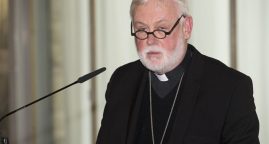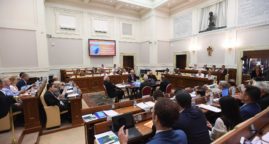‘the common good and a shared vision for the next century’
Read the Archbishop of Canterbury’s address on a future vision for Europe, delivered this evening at the Catholic Institute of Paris during a ceremony awarding the Archbishop an honorary doctorate.
It is a great honour to be with you here today, and to receive this most prestigious of honorary doctorates.
We find ourselves today at a complex point in the life of Europe. There are many issues that appear to be pulling us apart, and our political leaders are making difficult decisions about whether or how to move with those forces, or to resist and seek the strengthen the ties that bind us.
There are great uncertainties. In the week after the anniversary of the Bataclan, we are aware of the great threats of disorder, of the reality of those alienated, disturbed, radicalised. We are aware of the cry of dispossession and alienation in the British referendum and the US election.
We hear the cry, and fear its echo across Europe, especially in those countries where the roots of democracy are shallow and the weeds of authoritarianism spread far and wide. Add to this the major economic and social challenges facing the continent, and it may seem frivolous to be talking about a vision of Europe in the 21st century in light of the common good.
In the midst of so much uncertainty, is it not better simply to prioritise our own well-being, whether that be as an individual, or as nation states? That is what many are saying. “The European elite is wrong. We must look after ourselves.” Certainly for many the response to Trump has been more Europe, by which they mean more centralism, more imposed federation, less flexibility.
My argument today is that such a response is wholly inadequate for the challenges that we face as a continent. In order to overcome these challenges, we need 21st-century answers. And we will find satisfactory answers only if they are grounded in a vision we can all recognise, and one that seeks the common good.
It is no use treating God as a means to a 21st-century Europe: to do so is the creation of an idol, not the service of the true God whose revelation in Christ is the foundation of our values. I shall be seeking to argue that Europe’s future lies in a process of subsidiarity, re-imagination and inclusion, especially the development of concepts of intermediate communities of many kinds.
This is a theological vision, one that allows commonality of vision, but sets strong boundaries to what is acceptable.
We need a 21st-century response that echoes Jean Monnet’s words at the signing of the European Coal and Steel Community Treaty: “This treaty… should open a breach in national sovereignty, by substituting for the barriers of the past, which have until now divided and impoverished us, common rules accepts by all and applicable to all for the common good.”
,
The immediate concern of the six nations that signed the ECSC Treaty was post-war reconstruction, based on mutually-beneficial economic and trade policies. Today we are faced with a different set of challenges.
But our response to these challenges – Brexit, the migration crisis, religiously-motivated violence and terrorism, and many other issues – must be to reach for the common good, intermediate institutions (schools, charities, companies, churches, civil society, families above all) and subsidiarity, rather than the barriers of the past. We must eliminate the barriers, tear them down – but not erect others, even more dangerous.
You may be sceptical of a British cleric talking about the common good and a shared vision for the next century – and with reason. To view the United Kingdom’s decision to leave the European Union as a raising of the drawbridge from all of our relationships with the European continent is something that none of us can afford. A vision for Europe must go beyond the boundaries of the European Union.
When the political tensions rise, as I am sure they will in the course of the next two and a half years before the UK formally leaves the EU, it is even more necessary for the church to speak in solidarity and witness together to a shared vision for life lived well together
It is in that spirit that I want to frame my words to you tonight. The path ahead for Europe must be, ultimately, of a catholic Europe. I do not mean Roman Catholic – although later in my speech I will talk about the need to draw on the deep well of Catholic Social Teaching, in order to develop a vision for Europe in the 21st Century.
The State of Europe: Economics
Since the creation of the ECSC and subsequently the Treaty of Rome, prosperity – enumerated most visibly in material and economic prosperity – has been a central pillar of European cooperation. The Treaties of Rome and Paris both refer to “the constant improvement of the living and working conditions of their [member states’] peoples”.
When we look at the progress made since the end of the Second World War, it is hard to argue that economically, European cooperation has been anything other than a great success. Of course, since 2008, this has not been the whole story. In Southern Europe particularly, talk of economic success would be met with confusion and anger.
Greece is the clearest example of that. It was urged to enter the Eurozone on essentially a false prospectus, with declared debt well below the reality, and thus outside the criteria for Euro entry. There was a level of collusion by all concerned, who wanted more countries in the Eurozone. By taking on what is essentially a foreign currency, a country loses the ability to service its debt by printing money to inflate its way out of its problems. It thus depends on trade balances and economic activity to generate income sufficient for all its needs, including debt service.
When the Great Recession arrived in 2008, it is little surprise to us now that Greece could not pay the bill. And because of previous mismanagement and even corruption by an elite, the poor of an entire nation have been put effectively into involuntary bankruptcy. The weight has fallen on those least able to survive, and when their own suffering was aggravated by the desperate plight of hundreds of thousands of refugees, and now millions, little help was given. What we have seen is the global market system, and especially the EU, lend people money to buy things and then strangle their hopes and futures when they cannot repay. What we now have is the biggest debtor’s prison in European history.
So on the one hand we look at the progress since the war and see a huge increase in the material wellbeing in the vast majority of Europeans. But on the other we see policies that are pushing and keeping large sections of entire countries in increasingly desperate circumstances, with no apparent vision for how the circumstance might be overcome.
The problems are accentuated by aspects of European Union practice in terms of centralisation, corruption and bureaucracy that provided cheap and easy ammunition for the opponents of the European ideal, and in the end created a mythology which has been absorbed in popular imagination in northern Europe and on its fringes.
At the same time Europe seems to have been in three layers: Brussels, the nations and individuals, or consumers. Lobbies exist, for farmers, or fish or many other sectors but there is less sense of towns and communities, of families and informal groups being valued, enhanced, and liberated.
Yet God’s creation of human society is far more than individual or bureaucratic: it is relational, and for it to be so every form of human relational institution from the base community of the family, to the small and medium sized business, or the church, or anything else must be treated as possessing legitimacy and value in the rich and luxuriant mix of European human society. It is, after all, these intermediate groups that have been behind the success of our countries and societies.
This neglect of the intermediate seems to me also to be at odds with the vision of the political leaders who first developed post-war European cooperation – Monnet and Schumann, Adenauer and de Gaulle. It was a vision that was deeply moral, deeply Christian, and full of hope.
A vision for “the constant improvement of the living and working conditions” of course requires economics as a tool for delivery. But we seem to have lost sight of how economics was harnessed to enable human flourishing, rather than economic structures enslaving human beings.
What is economic cooperation for? What is our vision for it? Is it simply that the line showing economic growth on a chart goes up? Or is there something greater – more hopeful – driving policy development?
I want to draw a distinction here between what we can call the general interest and the common good. As I have alluded to, the general interest is concerned with the general rise in the economic tide and makes that assumption that this will benefit everyone. My personal experience in Liverpool certainly showed me that this is not true. The common good is concerned with a rising tide that truly lifts all boats.
So national and regional economic policy must be reimagined – realigned – to liberate human flourishing. The means being concerned with growing inequality across the continent – not only in incomes, but also in wealth, health, education and many more areas.
This reflects a changing reality that, “although absolute levels of poverty and economic disadvantage [are] still highest in the former Eastern bloc, the sharpest contrasts [are] now within countries rather than between them”
It is through such concern that we will being to revive a vision of what economic is for that is more hopeful and human-centred than the more mercantilist policies we have seen in recent years.
The State of Europe: Social
The social makeup of Europe in 2016 is drastically different from the Europe of Monet and the other founding fathers. Since the reunification of Germany and the fall of the Soviet Union, we have seen a dramatic shift in how we understand ‘Europe’ – seen most clearly in the membership (desired or achieved) of the European Union. Newly independent states have emerged, populations have found themselves able to move more freely across the continent.
And yes, despite more integration at a political level – since the end of the Cold War, the EU has grown from 12 to 28 (soon to be 27) member states – there has been a notable and damaging absence of a clear process of integration within Europe, quite aside from the changes that we have seen in terms of those coming from beyond Europe’s borders.
As European has integrated economically – it has ignored the need to integrate our values, culture, dreams and ideals. In short – we have no common vision of what Europe is, beyond an increasingly complex web of economic activities.
Beyond this, the closest we have come to articulating what Europe is, is by talking about what it is not. Since the fall of the Soviet Union, Europe has been defined (particularly at its external borders) by exclusion, rather than inclusion. We need to recover that vision of what Europe is, or what we wish it to be, very quickly, and I will address this in the latter part of my address.
The failure to adequately address integration within Europe has clearly had a detrimental effect on being able to successfully address it with those who come to Europe from elsewhere. This initial failure derives in part from an assumption that by and large, we are all the same.
Europeans are fairly similar, we say, perhaps subconsciously. We generally look the same, dress the same, our past times and interests tend to overlap. Many of our cities look the same, particularly in Central and Eastern Europe.
But I would argue that these common features only amount to a superficial likeness. We face each other, and see something familiar, but we do not interrogate more deeply into whether this superficiality leads to a deeper cultural likeness.
We are finding this to be the case even within the borders of the United Kingdom. Most prominently in Scotland, but also in Northern Ireland, Wales – even Cornwall – we are hearing more and more articulations of a deeper and distinct understanding of culture, of history and so on. Those articulations are amplified and exacerbated significantly at the pan-European level…
Related Articles
Vatican official: Europe not immune to anti-Christian discrimination
03/31/2017.Archbishop Paul Richard Gallagher called on an “institutionalized dialogue” at all levels between civil authorities and religious groups to help foster religious liberty.
The “New Way of Working”: Bridging aid’s funding divide
06/09/2017. The so-called New Way of Working (NWOW) has, according to its champions, the potential to radically improve how emergency relief programmes are designed and delivered.
Keynote Address of His Eminence Cardinal Pietro Parolin “Co-operative Globalisation” Global Foundation “Rome Roundtable” Dinner
06/15/2018. “Co-operative Globalisation” on the Global Foundation “Rome Roundtable” Dinner.



